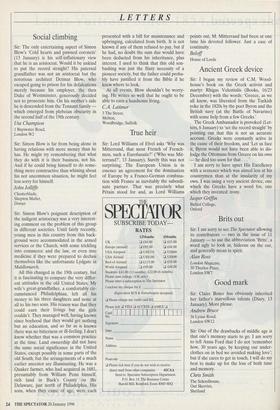Sir: Simon Blow's poignant description of the indigent aristocracy was
a very interest- ing comment on the problem of this group in different societies. Until fairly recently, young men in this country from this back- ground were accommodated in the armed services or the Church, with some trickling into commerce and the law, or even into medicine if they were prepared to declass themselves like the unfortunate Lydgate in Middlemarch.
All this changed in the 19th century, but it is fascinating to compare the very differ- ent attitudes in the old United States. My wife's great-grandfather, a comfortably cir- cumstanced Philadelphian, left all his money to his three daughters and none at all to his two sons. His reason was that they could earn their livings but the girls couldn't. They managed well, having known since boyhood that they would get nothing but an education, and so far as is known there was no bitterness or ill-feeling. I don't know whether that was a common practice at the time. Land ownership did not have the same social significance in the United States, except possibly in some parts of the old South, but the arrangements of a much earlier ancestor are illuminating. He was a Quaker farmer, who had acquired in 1681, presumably from William Penn himself, rich land in Buck's County on the Delaware, just north of Philadelphia. His sons, when they came of age, were each presented with a bill for maintenance and upbringing, calculated from birth. It is not known if any of them refused to pay, but if he had, no doubt the sum due would have been deducted from his inheritance, plus interest. I used to think that this old son- bashing was just the flinty necessity of a pioneer society, but the father could proba- bly have justified it from the Bible if he knew where to look.
At all events, Blow shouldn't be worry- ing. He writes so well that he ought to be able to earn a handsome living.
C.A. Latimer
3 The Street, Melton, Woodbridge, Suffolk


























































 Previous page
Previous page